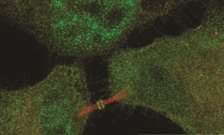Gene gives cells a 'safety belt' against genetic damage

(Medical Xpress) -- Researchers at King’s College London have identified a gene which offers cells a ‘safety belt’ against genetic damage by stopping them dividing at the wrong time.
DNA damage is a common cause of cancer and by identifying a significant element of the cell division process, the study could help identify new cancer research paths.
In a study published in Science Dr Jeremy Carlton and Dr Juan Martin-Serrano, from the Department of Infectious Diseases, found that the gene CHMP4C ensures cells divide at the right moment in the separation process, preventing DNA damage.
When cells separate they undergo a process known as abscission, a mechanism which physically divides the cells. Before the process can be completed an ‘abscission checkpoint’ prevents the cells separating while chromosomes are trapped at the abscission site, rather than being fully transferred into the new cell. Chromosomes become trapped in around five per cent of divisions and this can cause DNA damage.
CHMP4C is the gene responsible for temporarily stopping the abscission process until any ‘lagging’ chromosomes have been segregated into the new cells.
The study also showed cells lacking CHMP4C undergo abscission at a much faster rate, making DNA damage accumulation more likely than when the gene is present.
It was already known that a protein called Aurora B regulates the genes responsible for the ‘checkpoint’ process, but which genes it targets had not been identified until now. This study shows that the CHMP4C gene is activated by Aurora B and plays an essential role in the mechanisms governing the timing of the abscission checkpoint, acting as a ‘safety belt’ against genetic damage.
Dr Martin-Serrano said: ‘This is a really exciting new discovery. By identifying the role of this gene, it sheds a light on the mechanism at the very end of the cell separation process.
‘As genetic damage to cells is a major cause of cancer, understanding the process by which cells divide safely is of great importance.’
The research opens up a new avenue to study the basic mechanisms that prevent DNA damage during the last stages of cell division. Future studies will investigate whether the inactivation of CHMP4C, due to a mutation, might cause cancer. The researchers intend to study the gene’s activity in tumour cells to establish this theory.
More information: ESCRT-III Governs the Aurora B-Mediated Abscission Checkpoint through CHMP4C, Science (2012).

















